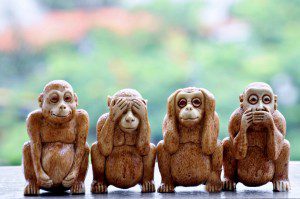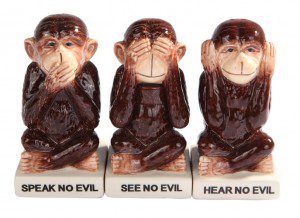| Online: | |
| Visits: | |
| Stories: |

| Story Views | |
| Now: | |
| Last Hour: | |
| Last 24 Hours: | |
| Total: | |
Idiots, Zealots, Elitists and Patriots: The Four “Wise Monkeys” of Modern Society
Contributing Writer for Wake Up World
Characterized by how they respond to information, modern societies are made up of four archetypes of people — idiots, zealots, elitists and patriots. Idiots refuse information, zealots refute information, elitists misuse information and patriots seek and distribute information. These archetypes are true of patriarchal societies around the world, and has probably been the case since Homo habilis was a boy.

While consistent across cultures, these archetypes have been subdivided in many ways, have borne countless different names, and their attitudes toward one another have varied (slightly) from age to age. But the essential dynamics of society has never altered. Even after enormous upheavals and irrevocable changes, the same pattern has historically reasserted itself over time, just as gravity finds equilibrium.
Idiots, Zealots, Elitists and Patriots
These four societal archetypes are inevitably intertwined, and their aims entirely reconcilable. Although their behaviors are dissimilar, their differences fit together into one dysfunctional whole, comprising a society’s collective relationship to information, and indeed, its own truth.
To expand on the definition offered above, idiots avoid all new pertinent information in order to maintain their perspective, never questioning the status quo. Zealots ask certain questions of certain information, ignoring unaligned information in order to maintain their perspective, supporting the status quo at all costs. Elitists question information in order to manipulate and reap gains off those who don’t know, benefiting from the status quo. Patriots question information to educate themselves and share it with others, in order that we might progress beyond the status quo.
Despite dramatic alterations in the world’s geopolitical landscape, and some fluctuation of individuals from one group/role to another over time, the dynamic between these groups has historically remained the same. What has changed in the technological age is simply that we have more ways and means to use, misuse, refute and refuse information.
Today, just as ever, idiots avoid all new pertinent information in an attempt to maintain a limited, comfortable perspective. Zealots believe they have “the answer”. They ask certain questions of certain information, but ignore and dissociate from information that is unaligned to their pre-determined perspective. Elitists question information in order to manipulate those who do not have that information, to their own benefit. Patriots – true patriots – question information to educate themselves and share it with others in order that all may progress.
These archetypes may seem like generalizations; and they are. They are also ancient and universal in structured societies. How people interact with new information is a result of both primal response and experiential programming, so understanding these archetypes can reveal a great deal about people and their character. In my experience as a truth-seeker and an activist – a patriot – this is the only thought-model or assumption that can truly help us understand how people relate to information, and therefore how we can best relate information to them.
The Four Wise Monkeys
There is an ancient adage and image that depicts the thinking and being of people through a series of archetypal monkeys; Hear no evil, see no evil, and speak no evil.
 Commonly known as The Wise Monkeys or The Three Wise Monkeys they are typically depicted sitting next to each other in a row. One covers its eyes, blinding itself. The second covers its ears, deafening itself. The third covers its mouth, gagging itself. Of these supposedly wise monkeys, none seem much the wiser for its ignorance. In fact, each character is hampering itself and its experience of its surroundings – of truth and information – in one way or another. And yet this adage of ‘wisdom’ is still widely accepted.
Commonly known as The Wise Monkeys or The Three Wise Monkeys they are typically depicted sitting next to each other in a row. One covers its eyes, blinding itself. The second covers its ears, deafening itself. The third covers its mouth, gagging itself. Of these supposedly wise monkeys, none seem much the wiser for its ignorance. In fact, each character is hampering itself and its experience of its surroundings – of truth and information – in one way or another. And yet this adage of ‘wisdom’ is still widely accepted.
What most people don’t realize, however, is that the depiction of these ‘Three Wise Monkeys’ is a deliberately incomplete narrative; there is actually a fourth Wise Monkey that is seldom depicted in western interpretation. Representing the virtue ‘fear no evil’, the fourth monkey sits with its arms folded over its abdomen. It is the patriot who, fearing no evil, questions information to learn and share it with others, in order that all may progress. It is indeed the only of the monkeys that shows any wisdom at all!
The four wise monkeys are reflective of the four archetypal reactions to information. In an oligarchical society, such as ours, which is structured to benefit a few at the expense of many, idiots shut their eyes to all information that puts this reality in their face and simply refuse to learn. Zealots fervently support the official narrative; they close their ears and do not hear what’s really going on, but tend to keep speaking nonetheless. Elitists keep their mouths shut and do not disclose what is seen and heard, understanding what is happening but opting rather for silence. Patriots, the least common of the monkeys, use all their senses; they observe but do not react in fear.
The archetype of the four wise monkeys is considered to be one of the oldest axioms with a corresponding image. The original concept has its roots in Chinese philosophy and can be traced back to at least the 8th century. In Japan, it is interpreted as akin to the Golden Ruleand is also a play on words. The Japanese word for monkey is saru and the expression in Japanese uses verb forms that sound like the word monkey; mizaru, kikazaru, iwazaru and shizaru. Outside Japan, the predominant presentation of the wise monkeys around the world lacks the fourth monkey, fear no evil, shizaru.
Previous articles by Ethan Indigo Smith:
- Marijuana Prohibition and The Suppression of The Divine Feminine
- Meditation 108: A Guide to Meditating for the Infant Practitioner
- Is Matriotism The Future of The Divine Feminine? (w/Andy Whiteley)
- A Little Green Revolution: the Rainbow Warriors will Heal the Earth Mother
- Individuality and Spirituality in the Age of Institutional Rule (w/Andy Whiteley)
- The 5 Tibetan Rites of Rejuvenation: 108 Movements to a Meditative Mind State
- Institutional Thinking – The Matrix, 1984 and The Allegory of The Cave
- Why Governments Promote Deadly Nuclear Energy and Ban Beneficial Hemp
- Hate: The Ultimate Social Control Mechanism
- Geoengineering and the Nuclear Connection (w/Andy Whiteley)
-
Follow Wake Up World On…
[FACEBOOK]: http://www.facebook.com/joinwakeupworld (An interactive community of over 2,200,000)
[PINTEREST]: http://pinterest.com/wakeupword/
[TWITTER]: http://twitter.com/joinwakeupworld
[YOUTUBE]: http://www.youtube.com/joinwakeupworld
[GOOGLE PLUS]: https://plus.google.com/112452105795129310867/posts
[WEBSITE]: http://wakeup-world.com




